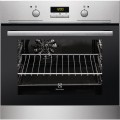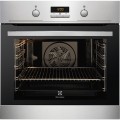Capacity
The working capacity of the oven. The amount of food that can be cooked in the device and the amount of space required for embedding depends on this parameter.
A capacity of about 50 – 60 litres is considered quite sufficient for a family of 2 – 3 people. It is the capacity that most modern built-in ovens have. However, there are other options — modest models of 20 – 30 litres, similar in capacity to microwave ovens,
large in capacity for home baking and large cabinets of 100 litres or more, designed more for cafes and restaurants than for home use.
Cooking temperature
The cooking temperature range allows you to understand which special tasks are subject to the oven. The lower temperature from which the oven starts heating, usually, is in the range of +30 to +50 ˚C. So, for example, the minimum heating temperature at
+30 ˚C allows you to defrost products. Models with a minimum of
40 ˚C and
50 ˚C allow you to heat ready meals, heat tableware (before serving), dry crackers, etc.
Number of modes
The number of cooking modes provided in the design of the oven. In this case, the cooking mode means the general opertaion mode — for example, “heating”, “heating + convection”, etc. Accordingly, this indicator strongly depends on additional equipment (see "Features"). However, even in similar models, the number of modes may be different. In general, the
more cooking modes, the more cooking options, the easier it will be to choose the optimal mode for a specific situation.
Energy class
This indicator characterizes how economically the oven consumes electricity. Initially, classes were marked in Latin letters from
A(highest) and further down as they went down. Later improved classes
A +,
A ++, etc. appeared (the more pluses, the better). More energy-efficient models are more expensive but can pay for themselves in the process of use, especially if you have to cook often and in large quantities.
Connected load
The electrical power consumed by the oven during operation, in other words, the power that must be supplied to the oven so that it can work normally. This parameter determines not only the total energy consumption (and, accordingly, the amount of electricity bills) but also the specifics of the power supply: with a power consumption of several kilowatts, a conventional outlet may not be suitable, and the wiring must be quite reliable.
Note that it is customary to indicate the connection power only for electric models (see "Oven"), as well as for gas devices with electric grills.
Dimensions (HxWxD)
In the case of ovens, the dimensions determine not only the sizes, but also the conditional form factor and the possibility of installing models. Dividing by height, the devices can be
compact(low) for installation in hanging cabinets and
full-sized — classic ovens for installation under the countertop. As for the width, in addition to
standard models of 60 cm, there are
narrow (45 cm) and
wide (90 cm) models to interact with similar wide hobs.

